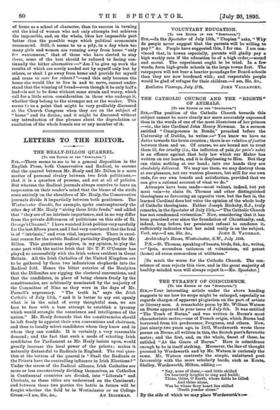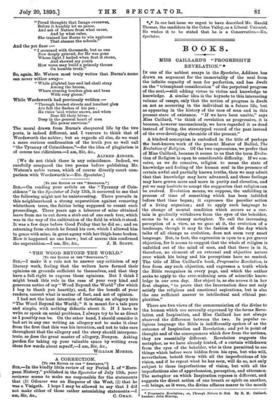THE TYRANNY OF COINCIDENCE.
[To THE EDITOR OF THE " SPECTATOR:] SIR,—Your interesting article under the above heading
suggests to me how its scope might be enlarged, especially as regards charges of apparent plagiarism on the part of artists or literary men. A remarkable poem by Mr. William Watson on Burns appeared in your issue of July 6th. It was entitled "The Tomb of Burns," and was written in Barns's most characteristic metre,—one of French origin, which Burns had borrowed from his predecessor, Ferguson, and others. Now; just ninety-two years ago, in 1803, Wordsworth wrote three- poems on Burns, all written in this, the Scotch poet's favourite metre; and the first, and, on the whole, finest of these, he entitled "At the Grave of Barns." Here is coincidence
enough to be in itself striking. Moreover, the line of thought pursued by Wordsworth and by Mr. Watson is curiously the same. Mr. Watson contrasts the simple, unlettered poet favourably with the more scholarly bards, such as Keats,.
Shelley, Wordsworth, Milton, adding :—
"Nay, none of these,—and little skilled On heavenly heights to sing and build; Thine, thine, 0 Earth, whose fields he tilled.
And thine alone, Was he whose fiery heart lies stilled 'Neath yonder stone."
By the side of which we may place Wordsworth's :••••-
"Proud thoughts that Image overawes, Before it humbly let us pause, And ask of Nature from what cause, And by what rules, She trained her Burns to win applause That shames the schools."
And the yet finer
"I mourned with thousands, but as one Now deeply grieved, for He was gone Whose light I hailed when first it shone, And showed my youth
How verse may build a princely throne On humble truth."
So, again, Mr. Watson most truly writes that Burns's name can never wither away-
" While plighted lass and lad shall stray
Among the broom, Where evening touches glen and brae With rosy gloom."
While Wordsworth had previously written :—
" Through busiest streets and loneliest glen
Are felt the flashes of his pen : He rules 'mid winter snows, and when Bees fill their hives : Deep in the general heart of men His power survives."
The moral drawn from Barns's chequered life by the two poets, is indeed different, and I venture to think that of Wordsworth the nobler ; but as regards all else, do we want a more curious confirmation of the truth you so well call "the Tyranny of Coincidence,"—for the idea of plagiarism is of course too ridiculous.—I am, Sir, &c.,
ALFRED AINGER.
[We do not think there is any coincidence. Indeed, we carefully compared the two poems before publishing Mr. Watson's noble verses, which of course directly court com- parison with Wordsworth's.—En. Spectator.]



































 Previous page
Previous page